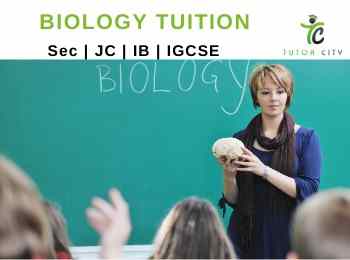
- Published by: Tutor City
- May 31, 2020
- Education
How To Score A1 for O-level Biology
To get an A1 for the O level Biology examination is an aim that many Secondary 4 students have, so we have curated some strategies from other graduating students to share with you.
Be it pure or combined sciences, the steps you have to take are similar, there is no easy way out!
Here are some revisions tips and strategies from biology graduates who know their stuff well:
Tip 1 - Understand the Exam Format
The GCE ‘O’ Level Biology Examination tests students’ abilities on applying biology concepts to problems which also require deep knowledge of biological definitions. The format differs for pure and combined Biology
For pure biology, there are 3 papers:
Paper 1 - MCQ, 30% of total score
This consist of 40 compulsory multiple choice questions.
Paper 2 - Free Response Questions, 50% of total score
Section A with 50 marks, Section B with 30 marks
There are 2 compulsory questions and 1 data-based question.
Paper 3 - SPA (Practical), 20% of total score
This is done during school time and students are tested on their observation, analysing and planning skills.
For combined biology, there are a different combination of papers. For example, a student taking combined Physics with Biology will be taking Paper 1, 2, 4 and 5.
Paper 1 - MCQ, 20% of total score
This consist of 40 compulsory multiple choice questions.
Paper 2 (Physics)- Free Response Questions, 32.5% of total score
or
Paper 3 (Chemistry)- Free Response Questions, 32.5% of total score
or
Paper 4 (Biology)- Free Response Questions, 32.5% of total score
2 sections, Section A consist of compulsory questions and Section B you have to choose 2 out of 3 questions.
Paper 5 - SPA (Practical), 15% of total score
This consist of 1 or 2 compulsory questions on each of the 2 sciences.
Tip 2 - Master Key Topics
For pure and combined biology, there are some topics that you need to have a good grasp of so as to answer all types of questions.
+ Principles of Biology, key areas are Cell Structure and Organisation, Movement of Substances, Biological Molecules.
+ Maintenance and Regulation of Life Processes: Nutrition in Humans/Plants, Homeostasis, Respiration & Excretion in Humans, Transport in Plants and Humans
+ Reproduction, Cell Division, Molecular Genetics
+ Man and his Environment
For full list of the topics being tested, you can check SEAB's website on their O-level syllabus.
Tip 3 - Know the Periodic Table well.
All Secondary students must know how to use the Periodic Table.
Students can save time checking up the periodic table if you know where to find the information and can also deduce selective scientific information from these data points.
Tip 4 - Plan Your Timings
Understand what each question needs to be answered and the marks allocated, so you can plan your time around it.
If you are stuck and cannot recall, don’t waste time and move on!
Higher-end questions that require more detailed answers such as ‘Based on your observations…’ will have more marks allocated to it, so spend more time on these.
Tip 5 - Create Your Own Notes
There are many students who swear by this. Creating your own notes always works, even just copying word for word from your textbook would you give you a good overview of the topics.
Build up your content knowledge by creating your own notes, even if they will end up with hundreds of pages as Bio notes are all very long.
Write notes from your own understanding so its easier for you to memorise.
For those things that you don't understand, ask your biology teachers or classmates to explain.
You can also create a definition list to compile all those you need to know, so you won't lose marks on questions that are asking about definitions.
Tip 6 - Practice for MCQ
The MCQ section is purely practice, practice and more practice. Drill yourself with all the assessment books and past years papers that you can find. Its all pure content and aim for 35 marks at least.
Tip 7 - Practical SPA
The important thing to do is to always read off your data to try to make as many correct observations as possible.
Even if you get the wrong results, keep calm. Write your data and think of a reason from the observations. Try not to redo the whole test as you may get penalised if you didn't change your answers based on the new data.
Tip 8 - Hire an expert Biology tutor
It is not an impossible task to score an A1 even if you are left with 3 months to go. Practicse with the tips above diligently and if you need assistance, get a good biology tuition specialist to give you a further boost.







